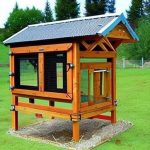Chicken coop maintenance is an essential aspect of raising backyard chickens. It is crucial for the health and well-being of your flock. A well-maintained coop provides a safe and comfortable environment for your chickens, allowing them to thrive and lay eggs. Neglecting coop maintenance can lead to various issues, including the spread of disease, poor egg production, and even the loss of your chickens to predators. By implementing proper maintenance practices, you can ensure that your chickens are happy, healthy, and productive.
Key Takeaways
- Adequate space in the chicken coop is crucial for the health and well-being of your chickens.
- Keeping the coop clean and dry helps prevent the spread of disease and parasites.
- Proper ventilation is necessary to maintain good air quality and prevent respiratory issues.
- Installing proper lighting can help regulate egg production and promote healthy growth.
- Keeping the coop safe from predators is essential to protect your chickens from harm.
Provide Adequate Space in the Chicken Coop
One of the most important aspects of chicken coop maintenance is providing enough space for your chickens to move around and be comfortable. Overcrowding can lead to stress, aggression, and the spread of disease among your flock. The general rule of thumb is to provide at least 4 square feet of space per chicken inside the coop and 10 square feet per chicken in the outdoor run.
To calculate the appropriate amount of space needed for your flock, you need to consider the number of chickens you have and their size. For example, if you have 6 standard-sized chickens, you would need a coop that is at least 24 square feet (6 chickens x 4 square feet). If you have larger breeds or plan to keep more chickens in the future, it’s always better to err on the side of more space.
Keep the Coop Clean and Dry
Maintaining a clean and dry coop is crucial for preventing the spread of disease among your flock. Chicken droppings contain harmful bacteria that can lead to respiratory issues and other health problems if not properly managed. Regularly cleaning the coop helps remove droppings, feathers, and other debris that can harbor bacteria.
To clean the coop, start by removing all bedding material and soiled litter. Use a shovel or rake to scrape off any stuck-on droppings from surfaces. Once the coop is empty, sweep or hose down the walls, floors, and nesting boxes to remove any remaining dirt. Allow the coop to dry completely before adding fresh bedding material.
Maintaining proper hygiene is also essential. Wear gloves and a mask when cleaning the coop to protect yourself from bacteria and dust. Wash your hands thoroughly after handling chickens or cleaning the coop. Additionally, consider using natural disinfectants, such as vinegar or hydrogen peroxide, to sanitize the coop without exposing your chickens to harmful chemicals.
Provide Proper Ventilation
Proper ventilation is crucial for maintaining good air quality in the chicken coop. Poor ventilation can lead to respiratory issues, such as ammonia buildup from chicken droppings, which can cause eye and respiratory irritation. It can also lead to excess moisture, which can contribute to mold growth and other health problems.
To ensure adequate ventilation in the coop, provide openings for fresh air to enter and stale air to exit. This can be achieved through windows, vents, or even small gaps in the walls. However, it’s important to strike a balance between ventilation and protecting your chickens from drafts and extreme temperatures.
Consider installing vents with adjustable covers that can be opened or closed depending on the weather conditions. This allows you to regulate airflow while still providing adequate ventilation. Regularly check the vents and clean them if they become clogged with dust or debris.
Install Proper Lighting
Proper lighting is essential for the health and productivity of your chickens. Chickens require a certain amount of light each day to maintain their circadian rhythm and lay eggs consistently. Lack of proper lighting can disrupt their natural cycle and result in decreased egg production.
Install windows or skylights in the coop to allow natural light to enter during the day. This not only provides your chickens with a source of light but also helps regulate their internal clock. If natural light is not sufficient, consider installing artificial lighting in the coop. Use full-spectrum bulbs that mimic natural sunlight and provide the necessary wavelengths for optimal chicken health.
It’s important to maintain a consistent lighting schedule for your chickens. Provide 14-16 hours of light per day to stimulate egg production. Use timers to automate the lighting schedule and ensure that your chickens receive the appropriate amount of light each day.
Keep the Coop Safe from Predators

Predators pose a significant threat to backyard chickens. Common predators include raccoons, foxes, coyotes, snakes, and even neighborhood dogs or cats. It’s essential to take measures to secure the coop and run to protect your flock from these threats.
Start by ensuring that the coop is built with sturdy materials that can withstand predator attacks. Use hardware cloth or welded wire mesh with small openings (no larger than 1/2 inch) to cover windows, vents, and any other openings in the coop. This prevents predators from gaining access to your chickens.
Secure the perimeter of the run by burying hardware cloth or wire mesh at least 12 inches deep to prevent predators from digging under the fence. Install a secure latch on the coop door to prevent predators from opening it. Consider adding motion-activated lights or alarms around the coop to deter nocturnal predators.
Provide a Proper Diet
Providing a balanced and nutritious diet is crucial for the health and well-being of your chickens. A proper diet ensures that your chickens receive all the necessary nutrients for growth, egg production, and overall health.
A good quality chicken feed should be the foundation of your chickens’ diet. Choose a feed that is appropriate for their age and purpose (layer feed for laying hens, starter feed for chicks, etc.). Supplement their diet with fresh fruits and vegetables, such as leafy greens, carrots, and berries, to provide additional vitamins and minerals.
Additionally, consider offering treats such as mealworms or scratch grains in moderation. These treats should not exceed 10% of their daily diet to prevent nutritional imbalances. Always provide clean, fresh water for your chickens to drink.
Provide Clean Water
Clean and fresh water is essential for the health and well-being of your chickens. Chickens require water to stay hydrated, regulate their body temperature, and aid in digestion. Dirty or contaminated water can lead to dehydration, illness, and decreased egg production.
Regularly clean and refill your chickens’ water containers to ensure they have access to clean water at all times. Scrub the containers with a brush and mild detergent to remove any algae or bacteria buildup. Rinse thoroughly before refilling with fresh water.
Consider using nipple or cup-style waterers instead of open containers to minimize contamination. These types of waterers prevent chickens from stepping in or soiling the water, keeping it cleaner for longer periods.
Monitor the Chickens for Signs of Illness
Regularly monitoring your chickens for signs of illness is crucial for early detection and treatment. Chickens are susceptible to various diseases and health issues that can quickly spread among the flock if not addressed promptly.
Keep an eye out for changes in behavior, such as lethargy, loss of appetite, or decreased egg production. Look for physical signs of illness, including abnormal droppings, respiratory distress, feather loss, or swollen joints. If you notice any of these symptoms, isolate the affected chicken from the rest of the flock and consult a veterinarian for proper diagnosis and treatment.
Maintain a record of your chickens’ health and behavior to track any patterns or changes over time. This can help you identify potential issues early on and take appropriate action.
Proper chicken coop maintenance is essential for the health and well-being of your flock. By providing adequate space, keeping the coop clean and dry, ensuring proper ventilation and lighting, securing the coop from predators, providing a balanced diet and clean water, and monitoring your chickens for signs of illness, you can create a safe and comfortable environment for your chickens to thrive. Implementing these maintenance practices will not only keep your chickens happy and healthy but also increase their productivity and enjoyment. Take the time to care for your coop, and your chickens will reward you with delicious eggs and companionship.
If you’re interested in learning more about keeping baby chickens healthy, you might also find this article on “How Long for Chicken Eggs to Hatch Naturally?” helpful. It provides valuable information on the incubation period and the natural hatching process of chicken eggs. Understanding this timeline can be crucial in ensuring the health and well-being of your baby chicks. Check out the article here for more insights.
FAQs
What is the best food for baby chickens?
The best food for baby chickens is a high-quality chick starter feed that contains all the necessary nutrients for their growth and development.
How often should I feed baby chickens?
Baby chickens should be fed small amounts of food throughout the day, typically 3-4 times a day. They should always have access to clean water.
What kind of housing do baby chickens need?
Baby chickens need a warm, dry, and draft-free environment to thrive. A brooder box or a small coop with a heat lamp is ideal for keeping them safe and comfortable.
How do I keep baby chickens healthy?
To keep baby chickens healthy, provide them with a clean and dry living space, fresh water, and a balanced diet. Regularly clean their living area and monitor them for any signs of illness.
What are some common health problems in baby chickens?
Common health problems in baby chickens include respiratory infections, coccidiosis, and pasty butt. It is important to monitor them closely and seek veterinary care if necessary.
When can baby chickens start eating adult chicken feed?
Baby chickens can start eating adult chicken feed at around 16-20 weeks of age, depending on their breed and growth rate. It is important to gradually transition them to adult feed to avoid digestive issues.
Meet Walter, the feathered-friend fanatic of Florida! Nestled in the sunshine state, Walter struts through life with his feathered companions, clucking his way to happiness. With a coop that’s fancier than a five-star hotel, he’s the Don Juan of the chicken world. When he’s not teaching his hens to do the cha-cha, you’ll find him in a heated debate with his prized rooster, Sir Clucks-a-Lot. Walter’s poultry passion is no yolk; he’s the sunny-side-up guy you never knew you needed in your flock of friends!







